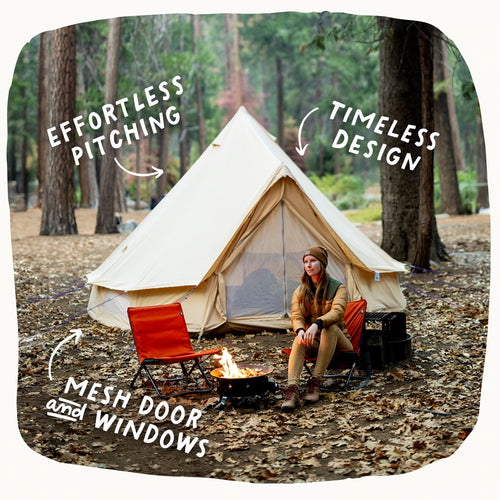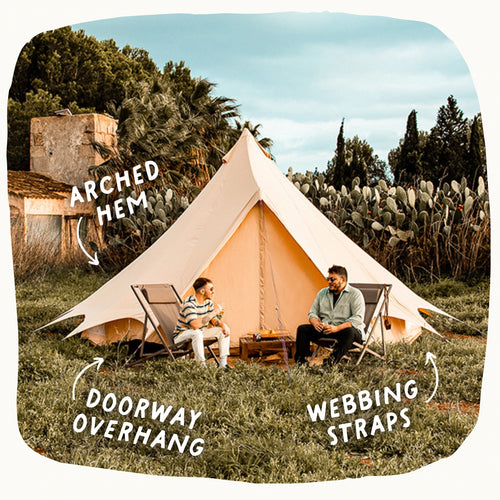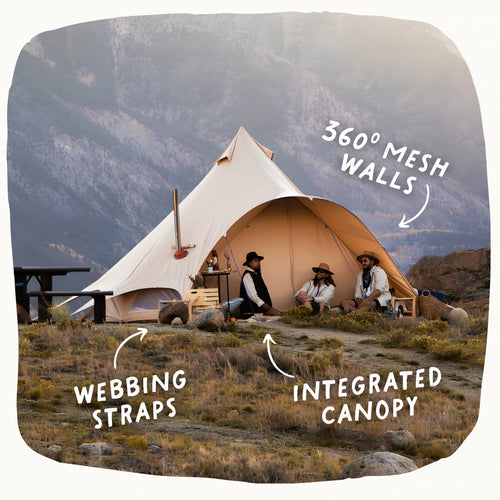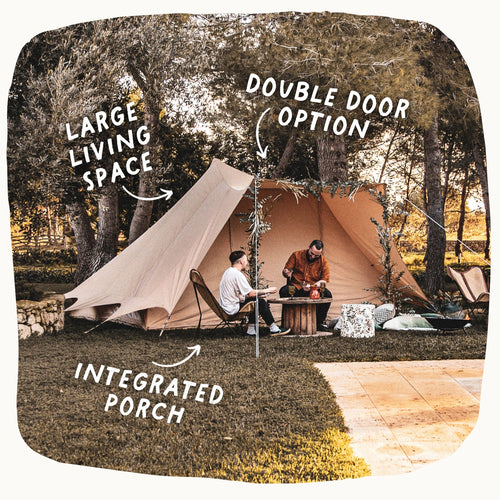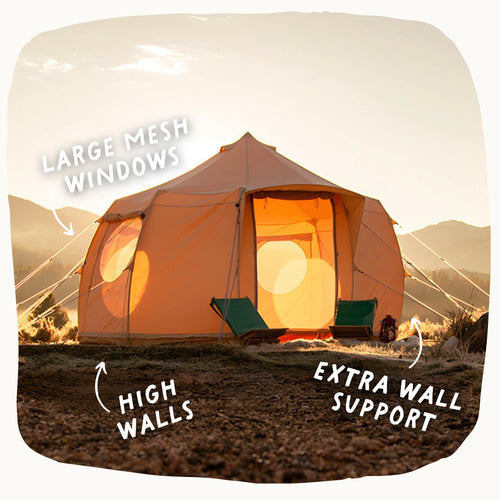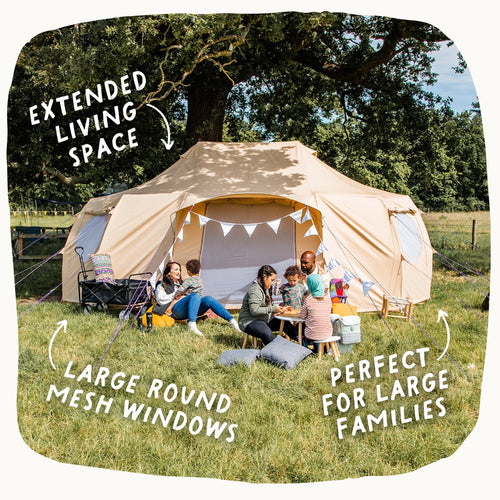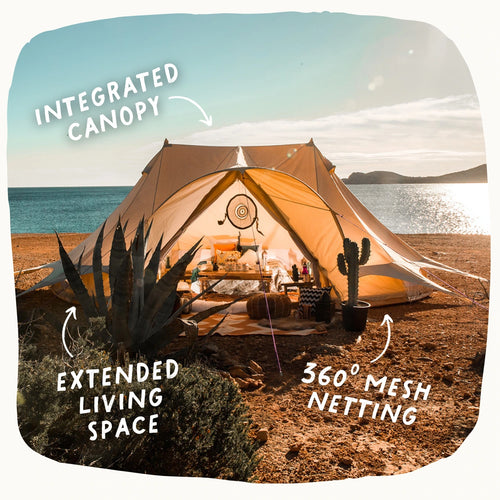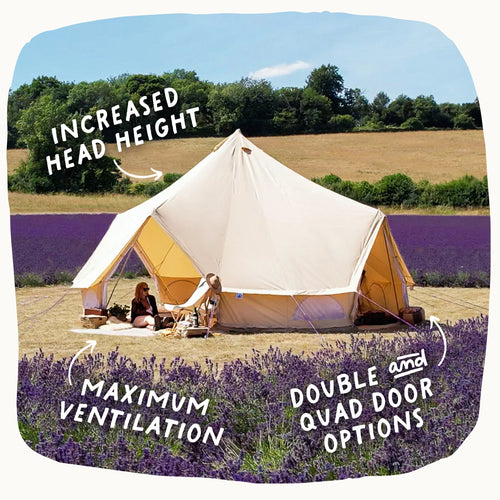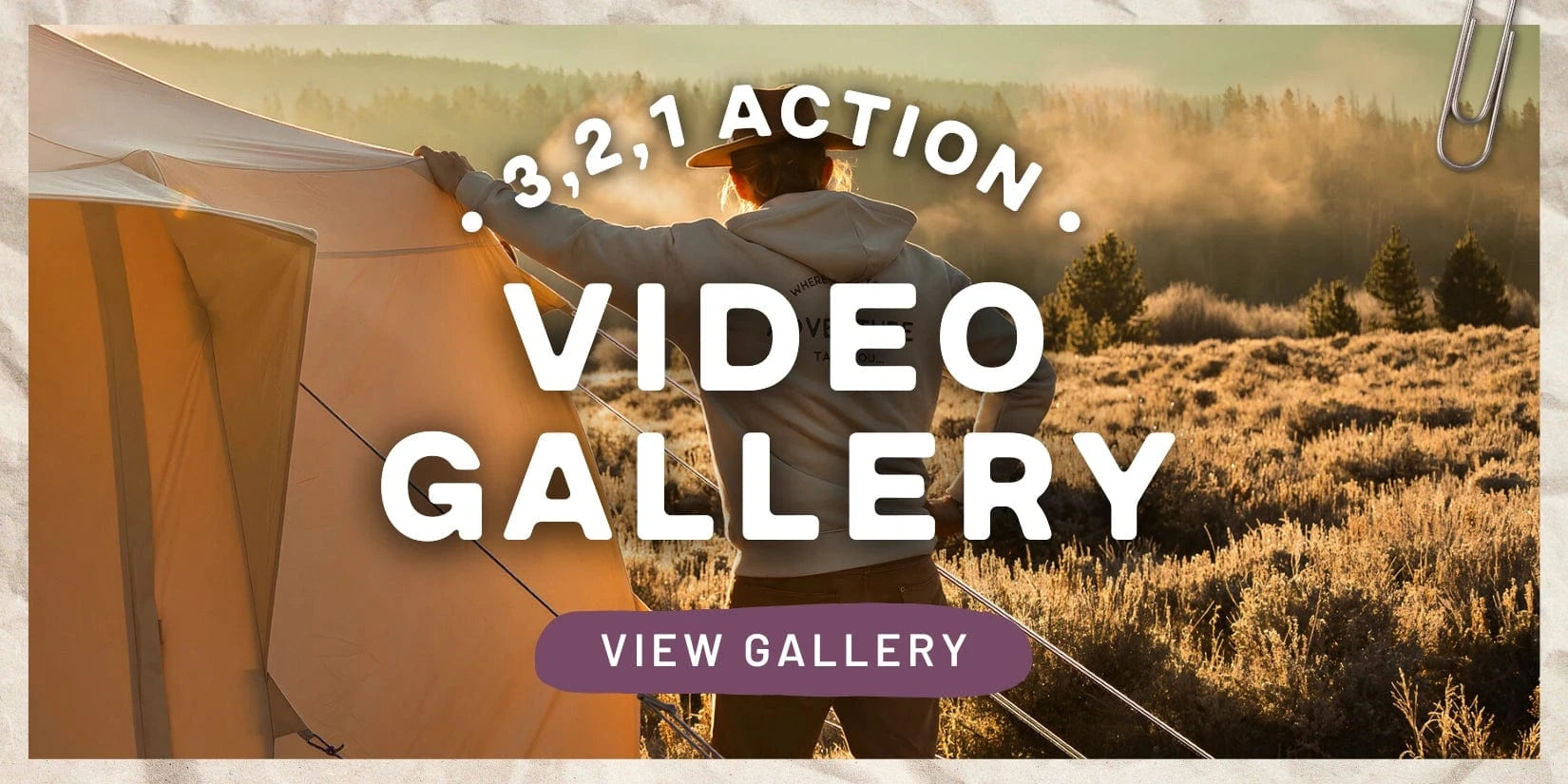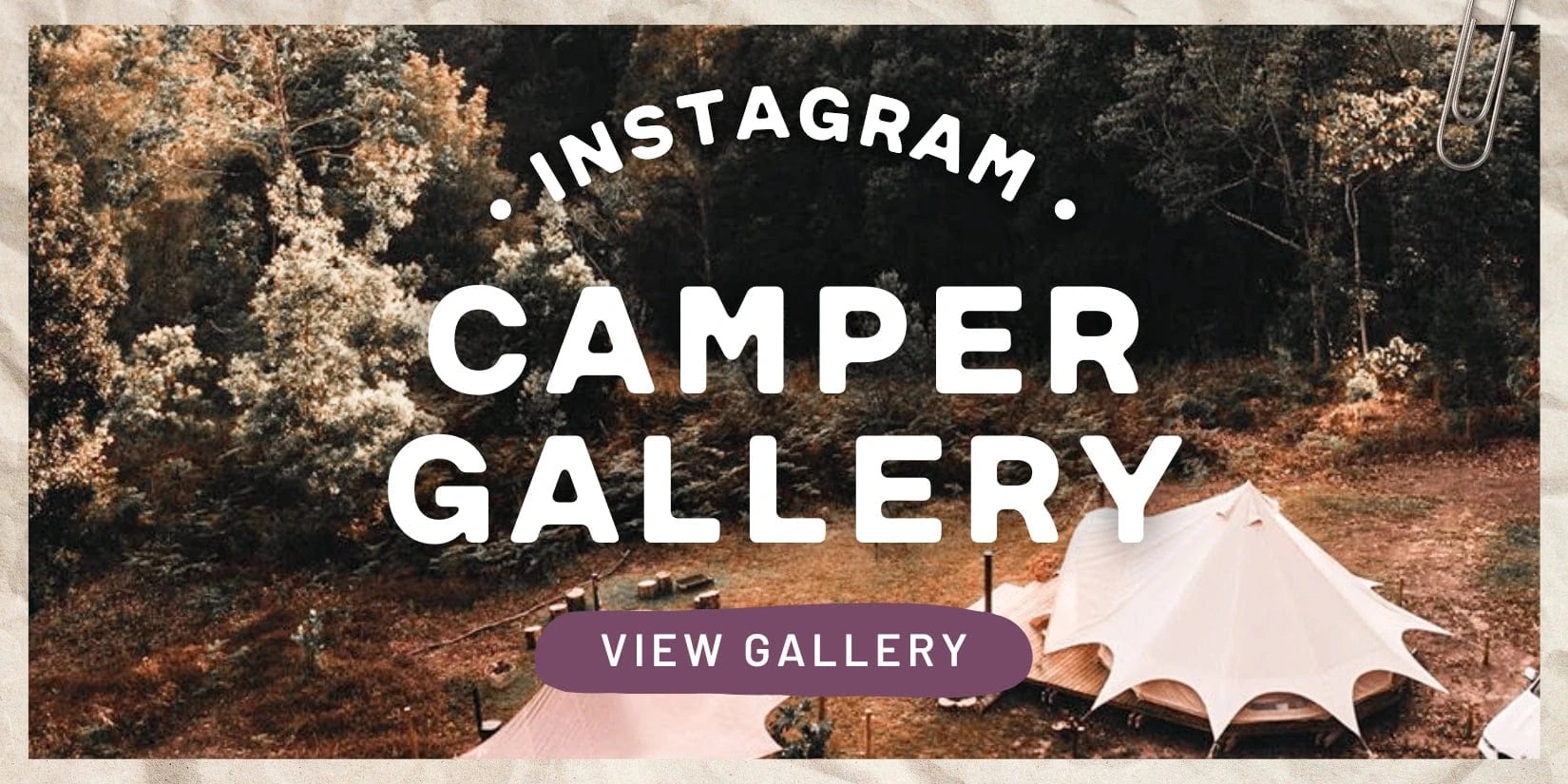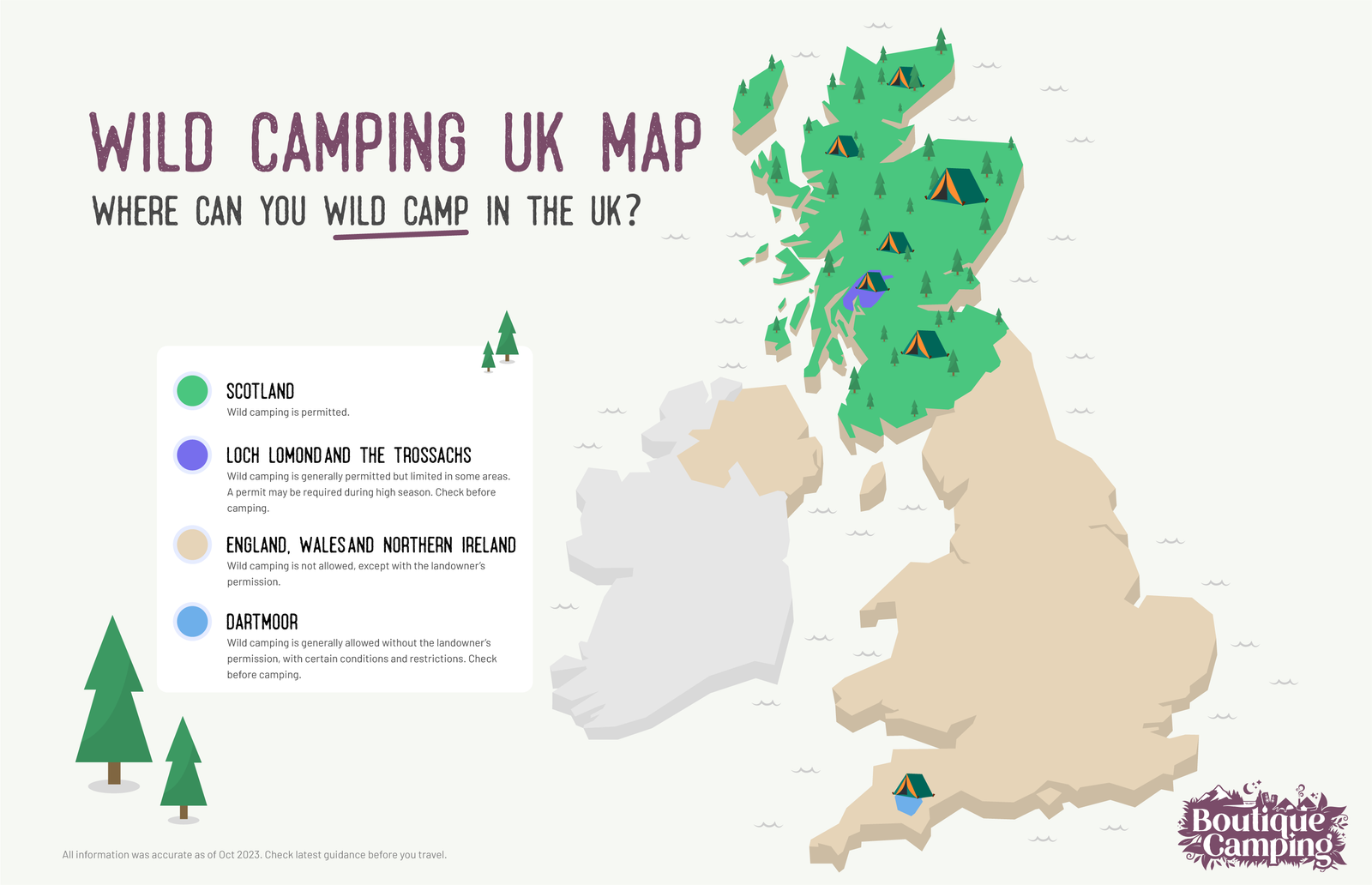what is wild camping and where can you do it in the uk?
Fancy getting off the beaten track and spending a few peaceful days in the wilderness? Wild camping offers the perfect getaway for those who are seeking a spot of quiet. The concept of wild camping is simple: you pitch your tent out in the open countryside, rather than in a dedicated campsite. This gives you more freedom over where you camp, as well as a chance to enjoy some real solitude.
But here in Great Britain, there are laws around where you can wild camp, and these vary quite a lot between regions. So, it’s important to read up on the rules and make a plan before you head out on any adventures.
In this guide, we’ll tell you everything you need to know about wild camping, including:
what is wild camping?
Wild camping is an overnight camping stay that takes place out in the open countryside, rather than on a private campsite. That means sleeping under canvas in remote places, far from any facilities like toilets or showers, and normally quite a distance from any towns or dwellings.
The remoteness of wild camping is all part of the appeal: with few other people around, it’s a chance to get back to nature. It’s just you, your tent, and the elements! Plus, when you have the freedom to choose your pitch, you can camp in some stunningly beautiful locations.
You might also hear wild camping referred to as backpack camping, boondocking, freedom camping, dispersed camping, dry camping, or free camping. These are all slightly different variations on the same fundamental idea: camping out in nature, away from a designated camping ground.
where can you camp wild in the uk?
Wild camping isn’t permitted in most parts of England, Wales, and Northern Ireland unless you have permission from the landowner, except for Dartmoor in South-West England. In Scotland, wild camping is allowed in most areas, with some restrictions around Loch Lomond and on enclosed land.
There are also certain codes of conduct you’ll need to follow when wild camping in any part of the UK — even if you do have the landowner's permission. In this section, we’ve detailed where you can and can’t wild camp, as well as the specific rules you’ll need to follow in each country.
scotland
Wild camping is legal in Scotland. The Land Reform (Scotland) Act 2003 allows campers the right to roam and pitch up on most unenclosed land across the country, without needing permission from the landowner.
As well as having some of the most liberal access laws in the UK, Scotland also boasts breathtaking scenery to explore — including two national parks. All in all, it’s the perfect wild camping destination for those looking to really get lost in the wilderness.
However, while wild camping is legal in most parts of Scotland, there are a few important rules and restrictions to bear in mind. For one, you can’t pitch up on enclosed spaces or private land, such as gardens or golf courses.
While wild camping is allowed within both national parks, some parts of Loch Lomond and the Trossachs are off-limits to wild campers to protect and conserve the land. During the spring and summer, you may also need to purchase a permit to camp in certain zones within the park. You can learn more about this on the Loch Lomond website.
When wild camping in Scotland, it’s also very important to follow the Scottish Outdoor Access Code. This includes:
- Leaving no trace. Take all rubbish and waste with you.
- Taking care not to damage vegetation.
- Asking permission if you want to camp near dwellings.
- Avoiding busy or popular areas, to avoid overusing the land.
- Not camping near livestock.
- Respecting wildlife.
- Using any cooking equipment responsibly. It's safer to use a portable stove rather than lighting a campfire, to minimise the risk of wildfires.
england
In England, wild camping is not allowed unless you have permission from the landowner, except for certain areas in Dartmoor. That means you’ll need to find out who owns the land you wish to camp on and ask for their express permission before pitching up for the night.
If that sounds like too much hassle, there are lots of designated private campsites that do their best to offer an authentic ‘nearly wild’ experience.
Dartmoor
There is one part of England where wild camping is permitted, under strict conditions: Dartmoor National Park.
A piece of legislation known as the Dartmoor Commons Act 1985 enshrines the right to "open-air recreation" on the common, meaning campers can pitch up in certain areas of the national park without needing permission from the landowner.
In January 2023, a new ruling briefly made wild camping illegal in Dartmoor, but this was overturned by The Court of Appeal in July 2023 (Guardian). There’s still a chance that the landowner might seek to challenge this latest ruling, so you should check the Dartmoor National Park website to see if there have been any further changes before you travel.
There’s also a strict code of conduct to follow in Dartmoor. Campers should:
- Visit in small group (less than 6 people).
- Bring minimal equipment. Ideally, you should take only what you can carry in a backpack.
- Travel on foot.
- Pitch your tent within the permitted areas - check the park
authority map when planning your trip. - Camp in a small and lightweight tent, ideally no larger than a three-person tent. Our ultralight 3m 2-person bell tents are ideal.
- Plan to stay for one or two nights at most.
- Try to stay out of sight.
- Leave no trace behind.
The following are not permitted in Dartmoor, outside of designated campgrounds:
- Family-sized tents. Dartmoor isn’t the place to bring all your gear, so travel light.
- Overnight stays in vehicles, including cars, motorhomes, and caravans.
- Large groups (more than six).
- Long stays (more than a couple of nights.
- Being noisy or disruptive.
- Pitching a tent within 100 meters of any building, road, or enclosure.
- Barbecues and cooking equipment.
If you don’t think you can stick to these rules, you might be better off camping in one of the many designated campsites within the park.
wales
Wild camping is not permitted in Wales without permission from the landowner, with no exceptions to this rule. But, that doesn’t mean you can’t enjoy the wild camping experience — you just need to make sure you have permission from the owner of the land before you set up camp.
Getting this permission means working out who legally owns the land and finding a way to contact them, which can be easier said than done.
However, many farms in Wales offer a ‘wild camping’ experience. While these are technically campsites, they are large and remote enough that you can still enjoy the privacy and scenery of wild camping, without breaking the law.
If you do decide to go down this route, you should bear in mind that nearly wild campsites may not boast the same facilities as a regular camping ground. So, you’ll need to come fully prepared with appropriate supplies and equipment.
northern ireland
Wild camping is not permitted in Northern Ireland, except with the landowner’s permission.
If you want to go wild camping in this beautiful country, then your best bet is to try and secure the permission of a landowner.
Or, if you could find a campsite that offers a ‘nearly wild’ camping experience, instead.
why is wild camping illegal in some parts of the uk?
If you love the British countryside and want to get out and explore, you might be wondering: why is wild camping illegal in most of England, Wales, and Northern Ireland?
The current legal framework can be traced back 200 years to the passing of the Vagrancy Act 1824. This legislation outlawed sleeping rough — regardless of a person’s reason for doing so — and also placed restrictions on the public’s right to roam.
The law is still in force in much of the UK, although it was repealed by the civic government in Scotland in 1982. While many nature lovers and wild camping enthusiasts have campaigned for the law to be changed throughout the rest of England and Wales, wild camping still isn’t permitted in most of the UK right now.
What is the punishment for wild camping outside of permitted areas?
If you’re caught wild camping without permission from the landowner in Wales, Northern Ireland, and England (excluding Dartmoor), then the landowner or the police can ask you to move on. If you pack up and leave, then there won’t be any further consequences.
However, if you refuse or return to the same spot after being asked to leave, you will be committing trespass. Under the Police, Crime, Sentencing and Courts Act 2022 (‘PCSAC’), trespass may be punishable by a custodial sentence of up to four months, or a fine of up to £2,500.
You probably don’t want to spend your whole trip worrying about getting caught. So, if wild camping isn’t legal in your area, then you’ll sleep much easier if you get the landowner’s permission or find a designated campsite.
what to take wild camping
Wild camping will take you to some pretty remote locations, and you’ll be far from the typical amenities you’d find on private campsites. So, you’ll need to make sure you have all the basic equipment to stay safe, warm, and dry during your trip. At the same time, you’ll want to keep things light, as you’ll be travelling on foot. Here’s a list of what to pack in your rucksack for a wild camping trip.
Shelter:
- Tent. Ideally, you want something compact and lightweight that will be easy to transport, like our 2 person 3m bell tents in Oxford Ultralight 100gsm fabric.
- Groundsheet or tent matting.
- Airbed and portable air pump, or a roll-up bed.
- Sleeping bag. Make sure this has the right thermal rating for the season and weather you'll be camping in.
- Sleeping bag liner.
- Camping pillow.
Food and cooking equipment:
- Small portable stove.
- Stove kettle or water heater.
- Gas canister.
- Lighter.
- Cooking pot or versatile cookware that can be used for lots of different dishes or purposes - for example, boiling water for tea as well as cooking breakfast.
- Eating utensils.
- Plate or mess tin.
- Camping mug or thermos.
- Water bottle or bag.
- If you'll be camping near a running water source, you can take a water purification device and tablets.
- Food. Around 700g or 1kg of food per person, per day is recommended. You can bring dehydrated, high-energy camp food favourites, like pasta, porridge oats, or rice, or you could bring a ready-made one pot meal that just needs reheating on the stove. Don’t forget to pack some tea or coffee and a few snacks and treats!
Other Gear:
- Torch/head torch.
- Waste towel or scoop, plus toilet paper or wipes.
- Lightweight, quick-dry towel.
- Emergency whistle.
- A bag to collect any rubbish. Remember to take this with you when you leave.
- Biodegradable soap or hand sanitiser. Wet wipes can also come in handy.
- Tick remover.
- Mosquito repellent.
- Mini first aid kit.
- Swiss army knife or pocket multi-tool.
- Weather-appropriate clothing and footwear. Even in the warm sunshine months, overnight temperatures can still be pretty chilly, so always bring a lightweight padded jacket, wooly hat, and extra socks. And, here in Britain, it's definitely always wide to bring good-quality waterproofs, even if rain isn't in the forecast!
Navigation:
- Mobile phone.
- Charged power packs.
- Map.
- Compass.
- GPS Unit.
Little Luxuries:
You’ll want to travel light when wild camping: after all, part of the fun and thrill is being as close to nature as possible. However, if you have space in your rucksack, you may still wish to bring a few lightweight items to make the wild camping experience even more magical.
- Binoculars or a mini telescope, for a spot of stargazing or wildlife watching.
- Deck of cards of mini travel games.
- A hip flask containing your favourite drink.
- A book or kindle.
- A journal. Wild camping is a great opportunity for a bit of peaceful reflection of gratitude journaling.
- Portable speaker (although you should try to keep the volume down to respect local wildlife.)
- Hot water bottle.
- Solar or battery-powered mini fairy lights. These add illumination and a whimsical ambience to your campsite after dark.
- A little décor for your tent. Bunting will add a cheerful colour to your campsite, while still being lightweight enough that it won't add much weight to your backpack.
staying safe
Wild camping is all about getting off the beaten track, and as long as you’re well prepared, you should be perfectly safe. However, it’s always sensible to take a few common-sense precautions, to ensure a safe and stress-free trip.
- Plan your trip carefully. Do your research before deciding where to camp and study a map closely before setting off, so you're familiar with the terrain.
- Notify a trusted friend before you leave. Always tell a friend or relative where you're going and when you'll be back, so they can raise the alarm if you don't return on time.
- Check the weather. Keep an eye on the forecast before your trip and pack accordingly. If very poor weather is forecast, it may be best to postpone your trip.
- Pitch up in a safe spot. Ideally, you want to pitch your tent on level ground, far from any hazards. Avoid camping on ridges or hilltops (due to lightning risk) or at the bottom of hills (due to flash flooding risk). You should also camp away from any trees in case high winds bring down branches in the night.
- Carry water. Dehydration can be dangerous, so carry plenty of water and bring purification tablets.
- Protect your skin from the sun during the day by covering up and wearing sunscreen.
- Camp with a friend. While solo camping can be perfectly safe, you may prefer to buddy up if you're just getting started.
- Be fire safe. It's best to use a stove and avoid lighting campfires. Always follow the manufacture's instructions.
With so many rules and regulations in place, working out where you can wild camp in the UK can seem confusing at first. But, as long as you stick to the tips in this guide, you should be on track for a safe, legal, and — most importantly — fun wild camping adventure.
Here at Boutique Camping, we have an extensive selection of high quality camping and glamping equipment, including classic Sibley bell tents and lightweight Nova air domes. Available in compact 2 person and 3- or 4-person sizes, these tents are just the right dimensions for wild camping trips. You’ll also find glamping essentials to make your trip even more comfortable, including equipment that makes putting up and taking down your tent a whole lot easier.
If you’re looking to enjoy five-star luxury while sleeping under the stars, then our camping blankets and bunting, camping lights, beds and bedding, and camping tables and stools will add comfort, style, and ambience to your campsite. Shop today to make your next trip your best.
